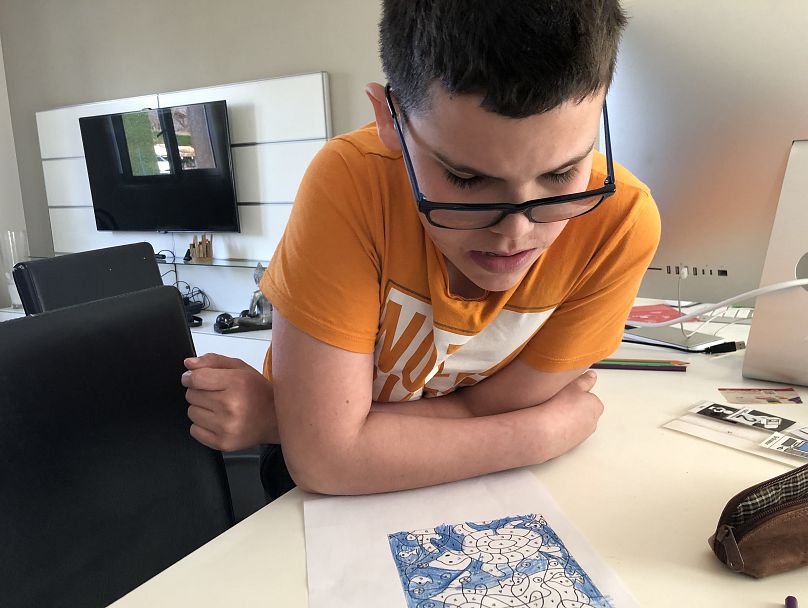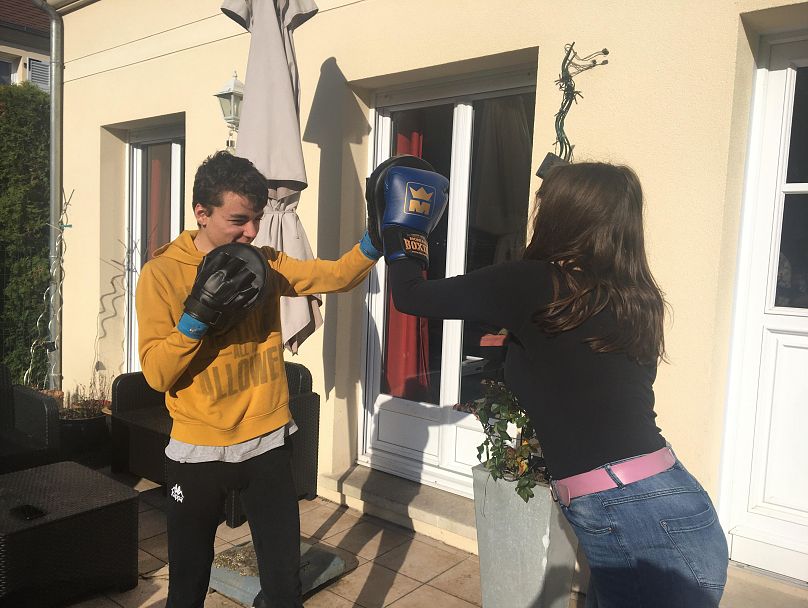One in 150 people have an Autism Spectrum Disorder in France and places in specialised schools are hard to get so for some parents, the lockdown and home-schooling is just "our normal".
With schools across Europe closed in an effort to contain the spread of the COVID-19 virus, millions of children and their parents are now being confined to their homes.
 ADVERTISEMENT
ADVERTISEMENT
 ADVERTISEMENT
ADVERTISEMENT
My eldest son has autism, severe epilepsy and associated learning difficulties. He also cannot talk so communication is often down to guesswork.
My current guess as fear, anger and incomprehension flicker across his eyes, is that he is suffering from heightened anxiety because the pandemic and the confinement measures have abruptly disrupted his routine.
We wholeheartedly embrace our duty to keep our son and ourselves at home, but as we do, we wonder how other parents like us are coping.
'This is our normal'
We have depended on France’s wonderful doctors, nurses and caregivers for nearly 20 years and have always been filled with admiration for medical staff despite witnessing the increasing strain the system is put under.
In France, an estimated one-in-150 people have an Autism Spectrum Disorder (ASD). Talking to parents who also have children with ASD, I've discovered that their experiences are as broad as the spectrum itself.
Several of the parents I spoke to told me the new restrictive measures have made little difference to their daily lives — about 80% of autistic children are excluded from mainstream school in France.
"Al hates crowds, lots of noise and he is home full-time because there's no available place at any specialised school, so this is our normal," Heidi told me.
Fiona, another mother, simply said that "self-isolation and homeschooling is a normal day for us with autism".
Isolation is one of the key by-products of autism. Research carried out by autism.co.uk shows that autistic people are among the most lonely in the United Kingdom.
Crowds and noises can be overwhelming and frightening, leading to sensory overloads which in turn can trigger behavioural challenges and difficulties. Parents, dealing with the prospect of a meltdown coupled with the glaring lack of empathy from by-standers choose to stay at home.
Nerves frayed and frazzled
For Kylian’s mum, Elodie, the situation is extremely stressful. Kylian does not understand what is happening and thus lurches from meltdown to meltdown.
With his school closed, she has to watch him every waking moment or face dealing with "catastrophes and tantrums". Add working from home and looking after her younger daughter into the mix and the situation is practically impossible to manage.
But on the bright side, she added, with what could be weeks of confinement ahead, new routines will inevitably be established.
Jennifer is in a similar situation. Her daughter Elise is struggling to understand what is happening.
"She is very stressed about her routine being thrown out of the window and constantly asks the same questions like ‘Is my school trip cancelled?',” she explained.
Fortunately, Elise loves sport and her brother has stepped in as personal trainer. "He helps her burn off energy, boxing with her on the terrace each day."
'Don't set the bar too high'
As parents of kids with an ASD struggle with this new normal, Aurelie Guilloneau, a psychologist who works with the teaching charity, Autisme Ambition Avenir, advised parents to set up easily achievable teaching plans.
"Do not to set the bar too high," she stressed. "Adapting to this new set of circumstances is difficult enough for kids and parents alike. Stay within the realms of the achievable, focus on activities that kids enjoy and remember lots of positive reinforcement is vital as this will, in time, help bring down behavioural difficulties."
Routines and rituals help establish stability and order for a person with an ASD. Visuals can help people with autism navigate these confusing times to establish a new set of routines.
Given the sudden nature of the crisis, there are not many visuals to clearly explain the coronavirus pandemic to people with an ASD.
But Mencap, a UK charity for people with learning difficulties, has provided an easy to read guide that could help some parents and people with an ASD.
Guilloneau is hopeful that new information and support for parents and carers will become readily available soon. Specialised teaching establishments in France are scrambling to find solutions, she said.
Therapists working from home are also looking into providing families with personalised timetables, visual support and to be on hand for much-needed advice, she added.
Another teacher told me that some specialist schools in France are considering re-admitting some children and adults if parents cannot cope.
As a mum with a kid with autism, I know first hand how difficult life can be to navigate. We have been homeschooling for over a week now and in small bursts.
We have made the most of being able to go out for walks and try to take things easy. My son has got angry with me as I try to make him complete activities but we have also laughed and laughed until our sides have hurt.
We will get there as I know other parents will too.
- Isabelle Kumar is a presenter for Euronews and the President of the Autisme Ambition Avenir charity
____________
Are you a recognised expert in your field? At Euronews, we believe all views matter. Contact us at view@euronews.com to send pitches or submissions and be part of the conversation.












